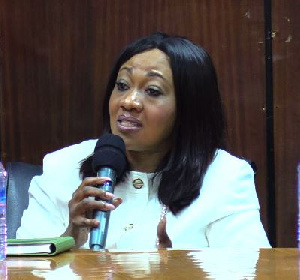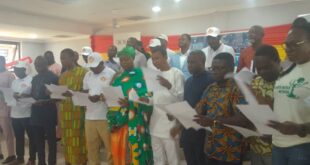Eligible persons who turn up for the forthcoming voter registration scheduled to commence at the end of next month would receive their cards instantly, the Electoral Commission (EC) has announced.
The instant delivery of voter identification cards is a novelty many Ghanaians would relish, considering the avoidance of the stress of waiting for the document.
There is a catch to the instant presentation of the voter identification cards: challenges cases would be exempted until the issue is resolved or ironed out.
In previous times, it took a while for the cards to be ready, an experience associated with the Ghana Card being issued by the National Identification Authority (NIA).
The instant voter identification card delivery was announced last Wednesday by the EC during an Inter-Party Advisory Committee (IPAC) meeting under the aegis of the EC.
It was a critical engagement by the EC with its stakeholders taking place close to a month before the commencement of the registration exercise.
Hygiene Protocols
The meeting offered the EC an important opportunity to lay out details of the registration and for stakeholders to comment on matters arising.
Of particular significance was the hygiene protocol agreed upon between the EC and the Ministry of Health and the Ghana Health Service details of which are intended to ensure the safety of both persons turning up to register and officials of the commission in the wake of the Covid-19 pandemic.
The 33,367 polling stations across the country would serve as registration centres, the EC said, adding that the cluster system would be applied for the task.
To be held simultaneously in all the district/constituencies countrywide each cluster would be made up of five registration centres.
The EC explained that “in all, there will be five phases during the registration period with each Registration Team working for a period of six days in each phase within the cluster.”
There will, however, be a day set aside for the assembling and preparation of materials for the next phase, the EC added.
Movement
Stakeholders will be apprised of the movement plan of the registration teams, the EC said as it laid out once more the criteria for eligibility.
There shall be a mopping-up period at the end of the exercise according to the EC and this, it explained, would take three days during which eligible applicants who could not be captured during the main registration would do so.
Pilot Phase
Being a new Information Technology (IT)-propelled system, the EC intends rolling out a pilot exercise at different locations in all the 16 regions, including its headquarters in Accra.
“The exercise is aimed at identifying possible problems associated with the new system and find ways of mitigating them. It will also help to study and ascertain the environmental impact on the VMS in respect to the weather (wet, dry, heat, and rust) conditions amongst others,” the EC pointed out.
Party Agents
Continuing, the EC urged agents of political parties to refrain from physically preventing suspected unqualified applicants from registering but rather resort to the challenge mechanism.
Police
The EC said it had written to the Ghana Police Service for assistance to protect the registration materials and other properties of the commission before, during and after the exercise.
Milestone
The EC under a new management has reached a critical milestone with all set for the compilation of a new and necessary voters’ role even in the face of crude threats from the opposition NDC.
Violent Signs
They have embarked upon demonstrations across the country, engaged willing think-tanks to campaign against the compilation of a new voters’ register and even threatening civil war, all so far to no avail as the EC has stood its ground on the need for a replacement of the existing roll of voters equipment for which are already in town.
Ofosu-Ampofo’s leaked audio said it all about how the NDC must go after the EC chairperson who has so far remained focused on her project to deliver free and fair elections.
NDC Boycott
The NDC was not represented at the IPAC meeting due to its opposition to the new register.
Seventeen parties were represented at the IPAC meeting; among them were the New Patriotic Party (NPP), People’s National Convention (PNC), Convention People’s Party (CPP), National Democratic Party (NDP), Ghana Union Movement (GUM), All People’s Congress (APC) and the Ghana Freedom Party (GFP).
Also in attendance were representatives of a cross section of civil society Organizations and development partners.
Source: Daily Guide
 Home Of Ghana News Ghana News, Entertainment And More
Home Of Ghana News Ghana News, Entertainment And More






